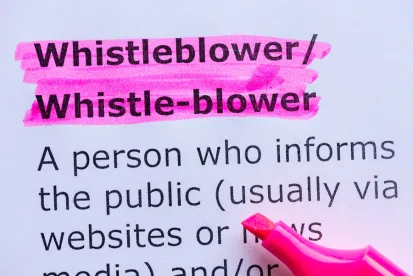The U.S. Department of Justice (DOJ) recently announced that a major pharmaceutical company, Novartis Pharmaceuticals, agreed to pay $642 million to settle a lawsuit alleging that Novartis violated the False Claims Act (FCA). That lawsuit was initially filed by a whistleblower under the “qui tam” provision of the FCA, which allows a private citizen to bring a case in the name of the government. While the exact amount the whistleblower received under the settlement has not been made public, the range dictated by the statute under these circumstances is 15-25% of the amount paid to the government. Meaning the whistleblower’s reward for bringing the case against Novartis was likely in the range of between $96.3 million and $160.5 million.
What was the basis for such a massive case? The answer: kickbacks. Novartis allegedly made “kickbacks” both to doctors and patients. The lawsuit alleged that Novartis ran “speaker programs” and other events that were, on the surface, billed as “educational events.” Those events were designed to funnel money, in the form of “honoraria,” to doctors in exchange for the doctors prescribing more of certain drugs sold by Novartis. The doctors also received lavish meals and other benefits from these programs.
Concerning patients, Novartis allegedly used charities to funnel money to patients to cover co-pays when those patients purchased certain Novartis drugs and sought insurance coverage under Medicare or other government-funded healthcare programs. Because Medicare would reimburse for the medications at such a high rate, even with those “charitable” donations, Novartis still made huge profits on those drugs.
The Novartis settlement is just the most recent in a string of large-dollar settlements of qui tam FCA cases involving kickbacks, most of which resulted in very substantial rewards paid to the whistleblowers who brought those cases. For example, my law firm represented a whistleblower who helped to reveal a scheme whereby a biotechnology company paid kickbacks to doctors and other employees of hospitals run by the U.S. Department of Veterans Affairs to induce them to use an artificial “skin” for wound healing. That case settled for $350 million, with more than $60 million in rewards divided among several whistleblowers.
If there is money to be made by charging Medicare or other government insurance programs for a service, a drug, or a medical device, it seems that someone is willing to devise a kickback scheme to capture a piece of that taxpayer-funded pie.
How do these types of kickbacks result in such massive liability under the FCA? The answer is in a different statute, called the Anti-Kickback Statute (AKS). The AKS makes it illegal to offer or pay “remuneration” to induce someone to make a referral to a healthcare service that will be paid for by Medicare or another federally-funded healthcare program or to induce someone to purchase something (for example, a drug or medical device) that would be paid for by such a program. Under the AKS, “remuneration” is a very broad term that the statute defines as a “kickback, bribe or rebate,” made “directly or indirectly,” and which can be in the form of either cash or “in-kind” payments. Both DOJ and the Department of Health and Human Services (which runs Medicare) interpret “remuneration” broadly to include pretty much anything of real value that could impact a decision to make a referral or to purchase a product or service for which Medicare, or the other covered programs, will ultimately be billed.
The AKS, however, does not, by itself, authorize a whistleblower to bring a qui tam lawsuit for AKS violations. Instead, the AKS essentially incorporates the FCA, stating that a claim for reimbursement from Medicare or another federal health care program resulting from an AKS violation “constitutes a false or fraudulent claim” under the FCA. A whistleblower knowing that a company providing some form of kickbacks in violation of the AKS likely can bring a qui tam lawsuit under the FCA. The damages recoverable in that type of case is the dollar amount of claims submitted to Medicare and other insurance programs, which is automatically trebled (meaning, multiplied by three) under the FCA. Then, on top of that trebled damages, a court can also impose additional penalties on the company. A relatively small kickback scheme could result in a substantial settlement or judgment in a qui tam case if that kickback scheme were successful in inducing doctors or patients to use or buy the service or product at issue.
If such a qui tam lawsuit is successful, the whistleblower will earn the rewards mandated by the FCA. Such rewards are typically at least 15% of the total recovery but can go as high as 30% under some circumstances. So, even a kickbacks case that results in a “small” recovery of, say, $10 million would earn the whistleblower an award of between $1.5 million and $3 million. The False Claims Act is one of those unique opportunities to “do well” while “doing good.” And, in recent years, this has been particularly true in cases involving kickbacks in the healthcare industry.




 />i
/>i

